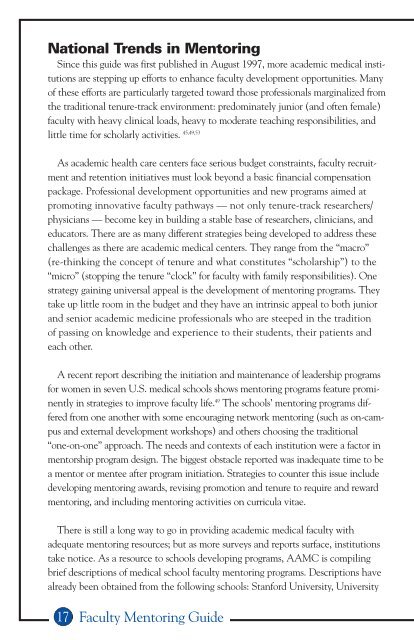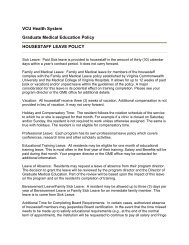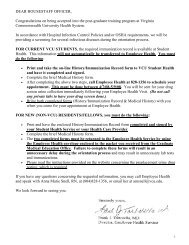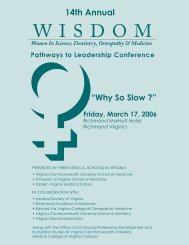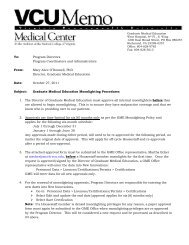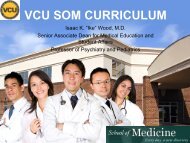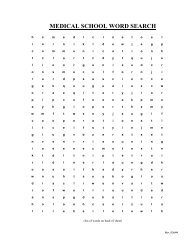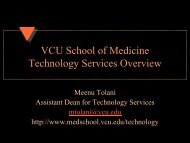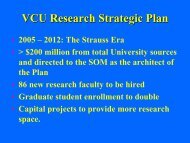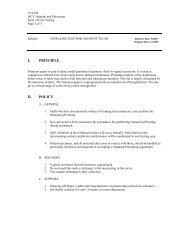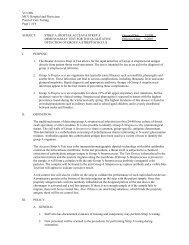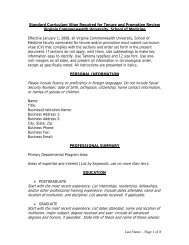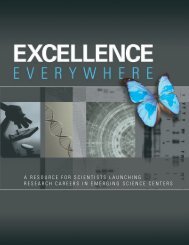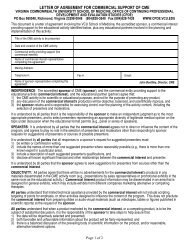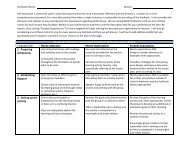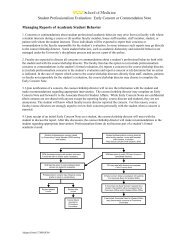Faculty Mentoring Guide - Virginia Commonwealth University ...
Faculty Mentoring Guide - Virginia Commonwealth University ...
Faculty Mentoring Guide - Virginia Commonwealth University ...
Create successful ePaper yourself
Turn your PDF publications into a flip-book with our unique Google optimized e-Paper software.
National Trends in <strong>Mentoring</strong><br />
Since this guide was first published in August 1997, more academic medical institutions<br />
are stepping up efforts to enhance faculty development opportunities. Many<br />
of these efforts are particularly targeted toward those professionals marginalized from<br />
the traditional tenure-track environment: predominately junior (and often female)<br />
faculty with heavy clinical loads, heavy to moderate teaching responsibilities, and<br />
little time for scholarly activities. 45,49,53<br />
As academic health care centers face serious budget constraints, faculty recruitment<br />
and retention initiatives must look beyond a basic financial compensation<br />
package. Professional development opportunities and new programs aimed at<br />
promoting innovative faculty pathways — not only tenure-track researchers/<br />
physicians — become key in building a stable base of researchers, clinicians, and<br />
educators. There are as many different strategies being developed to address these<br />
challenges as there are academic medical centers. They range from the “macro”<br />
(re-thinking the concept of tenure and what constitutes “scholarship”) to the<br />
“micro” (stopping the tenure “clock” for faculty with family responsibilities). One<br />
strategy gaining universal appeal is the development of mentoring programs. They<br />
take up little room in the budget and they have an intrinsic appeal to both junior<br />
and senior academic medicine professionals who are steeped in the tradition<br />
of passing on knowledge and experience to their students, their patients and<br />
each other.<br />
A recent report describing the initiation and maintenance of leadership programs<br />
for women in seven U.S. medical schools shows mentoring programs feature prominently<br />
in strategies to improve faculty life. 49 The schools’ mentoring programs differed<br />
from one another with some encouraging network mentoring (such as on-campus<br />
and external development workshops) and others choosing the traditional<br />
“one-on-one” approach. The needs and contexts of each institution were a factor in<br />
mentorship program design. The biggest obstacle reported was inadequate time to be<br />
a mentor or mentee after program initiation. Strategies to counter this issue include<br />
developing mentoring awards, revising promotion and tenure to require and reward<br />
mentoring, and including mentoring activities on curricula vitae.<br />
There is still a long way to go in providing academic medical faculty with<br />
adequate mentoring resources; but as more surveys and reports surface, institutions<br />
take notice. As a resource to schools developing programs, AAMC is compiling<br />
brief descriptions of medical school faculty mentoring programs. Descriptions have<br />
already been obtained from the following schools: Stanford <strong>University</strong>, <strong>University</strong><br />
17<br />
<strong>Faculty</strong> <strong>Mentoring</strong> <strong>Guide</strong>


